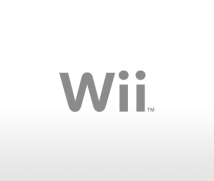3. Wii As A Shared Space For All the Family
Let’s discuss the Wii Message Board. Tamaki-san, you are the most familiar with the presentations on this topic, so could you please explain what the Wii Message Board allows you to do?
At the risk of oversimplifying, it is a system that allows messages and memos to be posted on the calendar. It can therefore be used without even being connected to the network. At its most basic, it is a place you can write memos. For instance, a mother might simply stick a message like “The snacks are over there!” onto the Wii Message Board. It’s basically like sticking a message on the door of the fridge. You enter these messages in the calendar on whatever day you want. Messages from the game you’re playing can also be put on the Message Board. For example, if you’re playing “Animal Crossing”, a message like “Concert next Saturday in town” will automatically be posted on the Message Board. The user doesn’t even have to be playing the game. Or take a game like “Brain Age”. You could post your results on the Message Board: “Today, your brain age is 50!”, or something like that. I envision the Message Board helping everyone in the family communicate with each other. These days, because everyone is so busy, it is becoming more and more difficult for people to take the time to sit around the table and chat. That’s where the Wii Message Board comes in. Even when families can't spend time together because everyone is always coming and going, a quick look at the Wii Message Board will allow the family members to feel the presence of the others, even if only slightly. You know, the father has maybe gone out after work, but when he gets home he can see that his wife has been keeping up the “Brain Age". I really hope Wii will prove useful in providing chances for this type of interaction between family members.
We wanted to make it collect memories over time, recording what different family members have done.
That's right. We really wanted it to be a console that would store your personal memories, something that people could grow attached to. At first, we thought of having the Message Board and the Calendar as separate functions, but we realised that the end result would be closer to what we originally had in mind if the messages were recorded on the Message Board. That's how we came up with the concept of having memos and messages stored according to date, which is how it is now. As its design is very simple, you can even use it like a diary by just filling in the day's events, and your game records are entered automatically too. It is a tool for preserving memories as well as linking family members together in an inconspicuous way. And it's not all one-way: the console is also capable of interacting with the user. That's the concept we had when creating the Wii Message Board, but what we've spoken about up to now is just its offline functionality, when Wii is not connected to the network. Once the console is online, it can also be used to share all sorts of information with friends. That isn't to say, however, that all of your information is available to other people. I should just stress the point, in case anyone gets the wrong idea, that this network basically works in the same way as the one for Animal Crossing on DS. That is, connection is not possible unless both users register each other. That means there won't be any unwanted communication from strangers, like harassment or suspicious spam messages.
It can be fun to be connected to the network, but it can be stressful or frightening if you are interacting with people you don't know.
Exactly. Basically, we've designed it so that you can exchange information with your registered friends. I'll give an example of the kind of information that could be exchanged. Let's say someone buys a new game. When they switch on their console, a question could appear on the screen: "Do you want to let your friends know you have bought this game?" If you select "Yes", the message "X has bought the game Y!" will pop up on your friends' Message Boards. You can send messages like that from within the game, or you can make your own message to send to your friends. Actually, the example I just gave is still under discussion and has not been finalised yet. But I think it gives you an idea of the kinds of things that would be possible.
It's not a system like e-mail, designed for constantly exchanging messages. However, we hope it will allow a relaxed style of interaction, allowing the user to feel that there are other people out there, connected to the net.

On top of that, with the Wii Message Board, users can exchange game data or screenshots. E-mail messages can also be exchanged between mobile phones and Wii. Sorry to keep using families for all the examples...! (laughs) But imagine the father is working late at the office. His family can send him messages via Wii from the living room. Then he could reply by sending a photo. We'd like people to think of Wii as allowing them to feel they are connected, in a loose, relaxed way, with their friends and family.
With the Wii Message Board, people can see that there are other people out there. It allows friends who might be far apart to be aware of what the other is doing.
That's it. We thought that this kind of loose, relaxed connection was ideal. Since the Wii Message Board uses WiiConnect24, that loose connection can be maintained round the clock. I'd love it if users turned on their Wii, just like they turn on the TV, thinking "I wonder if there's anything good on...".
I see. I think you have explained the Message Board's features pretty thoroughly! Anything else to add?
No! (laughs)
In a way, I feel that the Wii Message Board is the most complex aspect of the console, and which has the most unexplored possibilities. I have a feeling there are a huge number of applications which we just haven't come up with yet.
I would agree with that.
Precisely because of those unexplored possibilities and its vast potential, the Wii Message Board has not been limited to being just one of the Wii Channels. We decided to keep it separate from the Menu Screen, didn't we?
That's right. Initially, we included the Wii Message Board along with the other Channels in the Menu Screen panes. However, the Message Board has so many applications, and it can be used along with all the other Channels, so we thought it would be slightly misleading to line it up alongside the other Channels. In the end, to represent the way that the Message Board is working behind the scenes of the other Channels, we designed it so it would appear by sliding the entire screen. This means that when you turn on Wii, it's very quick and simple to see the Message Board.

Thinking about this function, it might have seemed more obvious to make it an e-mail option rather than a Message Board. So why did you decide to go for the Message Board?
We spoke about it earlier, but the reason lies with the kind of communication we were aiming at. Rather than individual users directly exchanging e-mail-style messages, we thought it much better to have a message board which lets users notify others of their presence. Something Tamaki-san spoke about from the start was the idea of a noticeboard in a university campus. When I heard him say that, I got it right away. That's why at the start we experimented with using a wood-grain design for the Message Board, or having the messages attached with a pin. In the end, though, we decided to make the Message Board match the overall design scheme.
Something which people often ask when they first see the Message Board is whether we couldn't have made it so that you can specify which member of the family the message is for. In other words, wouldn't it be better if each family member could have their own Message Board? However, the fundamental concept was to make the Wii Message Board more like a letterbox with several postcards in it than the inbox on a personal mobile phone. When you look in the letterbox you can see how many postcards have arrived, and you can see, for example, that "This one's for Dad!"
(laughter)
That becomes another opportunity for communication. The son or daughter goes to the letterbox and brings the postcards into the living room. On the way there, they casually glance at it and see that it is an invitation to a school reunion addressed to their father. Maybe they'll think, "Wow, Dad was young once too!" Of course, we had a fair number of discussions internally about, for instance, whether the whole family should be able to read messages from friends. But what we were aiming for was not an e-mail function. The idea of users having their own private space on Wii clashed with the overall concept of the console. That's why we did away with using the word "mail" altogether and decided to stick to the Message Board.
If we chose to, we could allow each family member to have their own account. But that just isn't what Wii is about. To give a very straightforward example, we're aiming at a console for everyone to use, but if we allowed everyone to have their own account, you would need to enter a password to use the console. To switch on Wii and be presented with a screen asking for your user name and password...well for me, that would have been unacceptable. In discussions, pretty much everyone agreed on this point.
I think that's right. Everyone felt it would go against what Wii stands for. After all, the whole company was straining to get the console up and running as fast as possible after the power is switched on. If we had put in a screen asking for user names and passwords...well, that would have been out of the question...
Besides, everyone would see you entering your password on the TV anyway!
(laughter)
That's why the more we thought about it, the more clear it was: Wii is a shared space for all the family. I think that some really fun stuff will come out of it precisely because it is shared by everyone, family and friends alike.
Just as we want the Wii Remote to sit on the coffee table for everyone to share, and just like your favourite Channel and your mother's favourite Channel are found on the same menu, we want the Wii Message Board to be somewhere where the family can easily share and exchange ideas. Everyone's entries in the calendar will go from being future plans, to becoming everyone's memories. With a device like that in the living room, I hope people will say "Wii is just like a member of the family!"

(laughter)
Listening to the discussion reminded me of another function which was discussed in a similar manner, and about which similar conclusions were reached: the "Play History". People tend to be very surprised when shown this function. Kuroume-san, can you tell us more about this?
Sure, it's really quite simple. Wii automatically records details of what game was played, when and for how long. This is called the Play History. There's nothing controversial about that, but what did cause discussion was the fact that the Play History cannot be deleted. It's not that we couldn't change it if we wanted to, but at the moment it is not possible to delete it.
I think it's best if I give a little background for this one. I've said this countless times already, but when developing Wii, I thought constantly about what we could do to stop games being regarded with hostility in the family. So I came up with a suggestion, perhaps a rather outlandish one! (laughs) What I thought was that if a parent said that their child was only allowed to play games for one hour a day, how about making it so the console actually turns itself off after an hour? I realise the head of a games company shouldn't think things like that! (laughs)
(laughter)
Of course, the console would save the game data before it switched itself off! Even so, it's a pretty extreme solution...but I was actually serious! (laughs) I knew it sounded awful! But it's only by throwing out wild suggestions that real debate is sparked, and new ideas are born. At least I think there's value in being aware of that during discussions. Those discussions were, predictably enough, rather heated! (laughs) Some people were adamantly opposed to the idea, while others thought that without such an extreme solution, mothers would always hate computer games.

It was a nightmare! I don't just mean the discussions, but also the technical difficulties involved...
Yes, it must have been. Especially since it was an order from the president! (laughs) I asked them to carry out research on whether it was possible for the console to save all the data after an hour, and what would happen when the console was turned on the next day. They explained to me in great detail how many difficulties the whole enterprise would present. They also told me that there were better ways to achieve the same goal than making the console switch itself off. That's why I eventually gave up on the idea!
(laughter)
What finally came out of those discussions was the idea for a Play History, which recorded the total time a particular game had been played. Rather than the console turning itself off automatically to ensure it is not played for more than an hour a day, it seemed much better to allow parents to use the Play History to discuss with their children how much they are using the console. The decision to make it impossible to delete this data was a separate subject for debate.
Even if a kid wakes up in the middle of the night and sneaks down to play games, that will show up on the Play History! (laughs)
Ultimately, the Play History fulfils the function of telling parents how long their kids have been playing, as well as being an interesting talking point. It's just really fun for users to be able to see the record of how long they played. That's why we decided to make the Play History impossible to reset. You can imagine users saying: "I didn't realise I'd been playing that game so much!"... Or, in the future, we could make it possible to plot on a graph how much you've played. Also, with users' cooperation, we could compile data on which game was the most played that year. I think all of these kinds of fun ideas show that it was better to make the Play History into a permanent record.
It all started from my rather outlandish suggestion, but we ended up with a lot of worthwhile ideas. Although I'm sure the idea got up some people's noses...
(laughter)
To wrap things up, if there is anything you find particularly appealing about the Channels that we haven't yet discussed, now's your chance.
Well, on the Wii Menu Screen where the Channels are listed, each Channel icon has its own unique and exciting animation. However, these animations do not necessarily stay the same. Some Channels will have a different animation depending on the circumstances. For example, the icon of the Forecast Channel might show that it is going to be sunny and 28 degrees today, so if you just want to know about today's weather, you can easily tell by looking at the icon. These things, I think, are a part of Wii's unique appeal.

This is a bit technical, but by using the + and - Buttons on the Wii Remote, the user can scroll through the Channels without having to return to the main Menu Screen every time. Each Channel actually has its own particular chime which sounds when you switch to that Channel. This means that simply flicking through the Channels becomes fun! (laughs) It's as if the Channels are welcoming you! We've put a lot of Channels on Wii and I think we surprised even ourselves by how much we were able to accomplish. I think just flicking between the Channels looking for something interesting is great fun, and I want as many people as possible to get their hands on Wii and just give it a go!
This is getting away slightly from the discussion of Wii itself, but just as Kuroume-san said earlier, I'd love to design my own Channel for the console. There's a lot of people in the company who have the same ambition! (laughs) Even people who aren't involved in software development are talking about Channels they'd like to see. I think that demonstrates perfectly the appeal that Wii has. I doubt any previous game console has inspired that sort of response. The Channel system, and the network infrastructure of WiiConnect24 behind it, have got people thinking. I have a feeling that even those who are not involved in the making of games will come up with unique ideas for Wii. I really think that Wii is a device offering a vast range of possibilities.

Summing up my feelings, I would say that in all honesty I did not expect to see the hopes that I had for Wii in the beginning so fully realised in the finished product. While developing Wii, I felt that if the ideas I had could be made reality, then this could really change the relationship between people and games. I felt that this would add a new dimension to families' everyday experience of using the internet and playing games. I thought it might change people's lifestyles, as families gather around the TV to enjoy a new type of entertainment. Now I can hardly wait to see how people respond to the console. I don't mean whether they like it or not; I mean it in the sense of wondering what uses people are going to find for Wii. I think we've really come up with something pretty special.
Can I just add something?
Be my guest! (laughs)
I want to see families fighting over the Channels!
(laughter)
